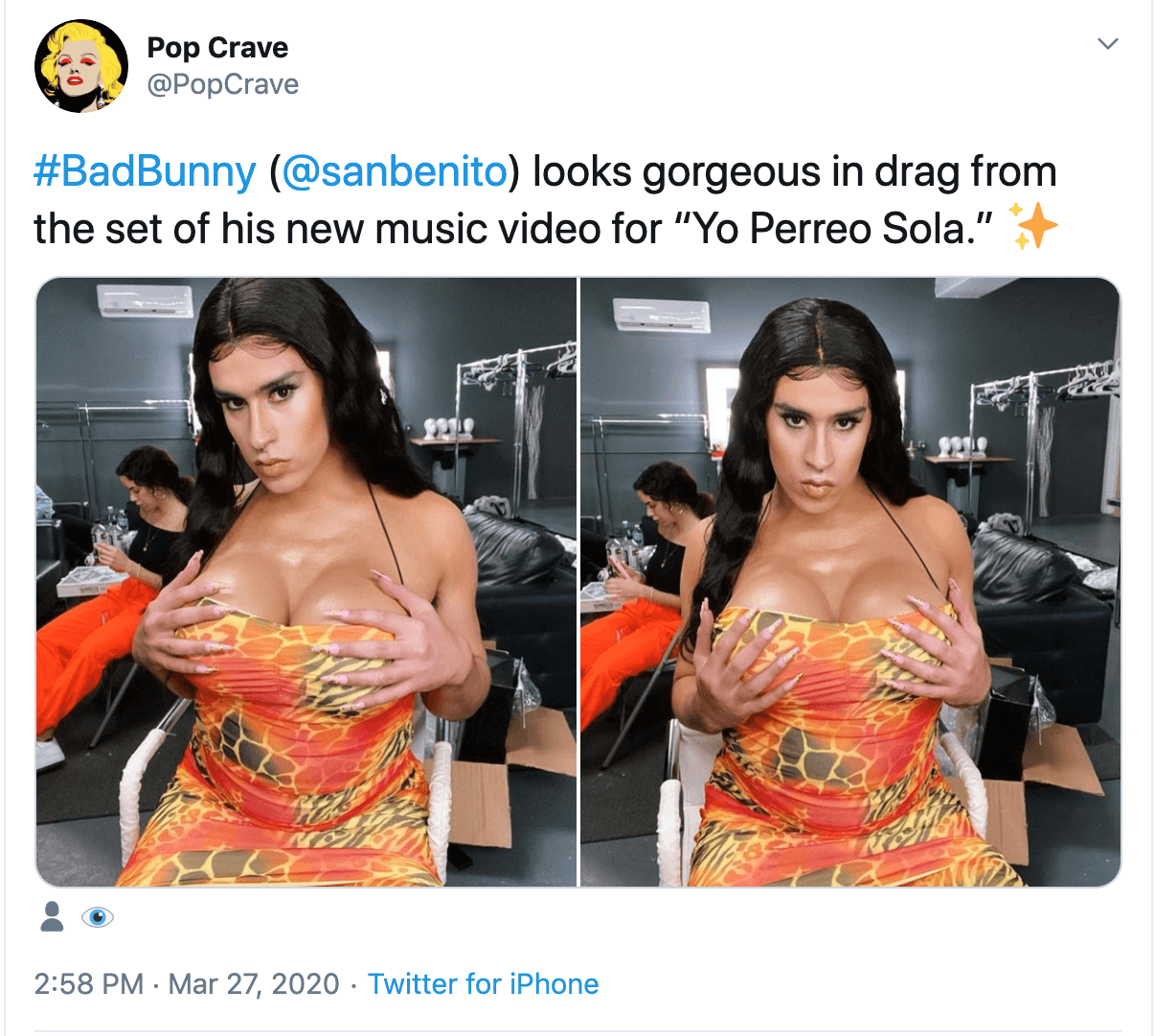Is Bad Bunny an Ally – or Appropriator – of LGBTQ Culture?

Which side is Bad Bunny really on? | Source: REUTERS/Caitlin Ochs
- Bad Bunny’s career exploded in March when he dressed in drag for a music video.
- The reggaeton artist just revealed that he’s straight, and he’s had a girlfriend for three years.
- It raises the question: did he just appropriate LGBTQ culture, or promote it?
Bad Bunny blasted into full icon status earlier this year.
Was it because of his music? Partly. How about his words? They were a factor. But Bad Bunny truly eclipsed superstar status when he dressed in full, fabulous drag in his music video for “Yo Perreo Sola.”
My initial reaction was that he had just done the “most gangster thing possible.”
But now, there’s a catch.
Bad Bunny just revealed that he’s straight. He just told Rolling Stone that he’s had a girlfriend for three years, saying:
I am with someone. She is very special in my life. This quarantine has made me understand that she is the best companion I could have.
As conversations of appropriation rightfully continue to rise around race and culture, we should at least ask the questions:
Can you appropriate a sexual identity?
Can you appropriate a gender?
Is Bad Bunny an ally or an appropriator?
The Do’s and Don’ts Of Cultural Appropriation
What, exactly, is “cultural appropriation”?

Dr. Kelly H. Chong, professor and chairperson in the department of sociology at the University of Kansas , told Bustle that cultural appropriation is:
The adoption, often unacknowledged or inappropriate, of the ideas, practices, customs, and cultural identity markers of one society or group by members of another group or society that typically has greater privilege or power.
As a straight man, Bad Bunny could be considered to have “greater privilege or power” than an LGBTQ member. And he certainly adopted their “practices, customs, and cultural identity markers” by dressing in drag.
He wouldn’t be the first celebrity to be accused of using another culture for their benefit.
Kim Kardashian was criticized for wearing cornrows. Rhianna was blasted for dressing like a chola. People skewered Zac Effron for his dreadlocks. A twerking Miley Cyrus was accused of appropriating hip-hop culture.

Is Bad Bunny any different? You could argue that he’s just riding the massive wave of LGBTQ culture.
“Queer Eye for the Straight Guy” has surged in popularity since hitting Netflix. “RuPaul’s Drag Race” has won the Emmy for the Outstanding Competition Program two years in a row. LGBTQ culture is exploding into the mainstream.
And a straight man just catapulted his career by dressing in drag.
Appropriation Vs. Appreciation
There are subtle distinctions between appropriation and appreciation. This is where Bad Bunny might fall on the right side of history. According to Good Housekeeping,
The key to expressing appreciation rather than appropriation is to understand the culture you’re borrowing from, including its history of oppression and marginalization.
Rap superstar Nicki Minaj echoed that sentiment. She told The New York Times Magazine :
Come on, you can’t want the good without the bad. If you want to enjoy our culture and our lifestyle, bond with us, dance with us, have fun with us, twerk with us, rap with us, then you should also want to know what affects us, what is bothering us, what we feel is unfair to us. You shouldn’t not want to know that.
Bad Bunny claims to understand and sympathize with the culture he’s borrowing from. Regarding his “Yo Perreo Sola” video, he told Rolling Stone:
I did it to show support to those who need it. I may not be gay, but I’m a human who cares.
The song translates to “I Twerk Alone,” and it’s about a woman who just wants to dance alone at the club without getting harassed.
I wrote [the song] from the perspective of a woman. I wanted a woman to sing it, because it doesn’t mean the same thing when a man sings it. But I do feel like that woman sometimes.
These sound like the words of an “ally.”
So, Where Does Bad Bunny Fall?
Ultimately, I’m not the person who can decide. That’s up to the LBGTQ community. I’m just raising the question.
From an outsider’s perspective, it appears as though Bad Bunny made the song in support of women and that he’s promoting gender fluidity. He’s adding a heavy dose of LGBTQ awareness into a reggaeton/hip-hop world that was all too comfortable with misogyny.
But it would be foolish to think that there won’t be anyone grasping for a meal-ticket that wasn’t meant for them. That might not be Bad Bunny, but it never hurts to ask questions.
Disclaimer: The opinions expressed in this article do not necessarily reflect the views of CCN.com.